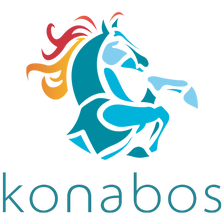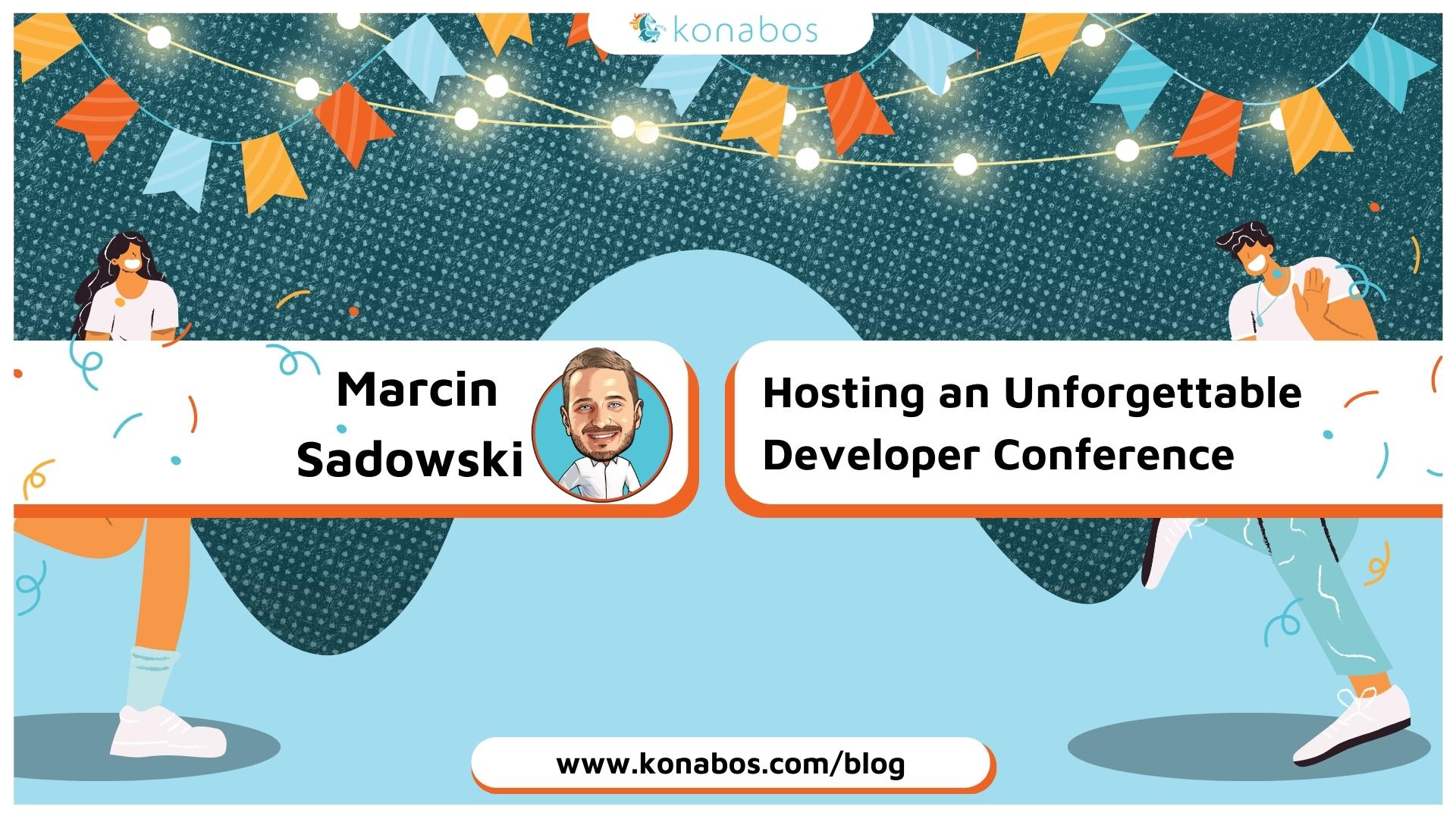How to Host an Unforgettable IT Developer Conference: A Starter Guide
Marcin Sadowski - Senior Delivery Manager
13 Aug 2024
Why Host a Programmer Conference?
The IT industry thrives on continuous learning, knowledge sharing, and staying abreast of the latest technologies and solutions. Public speaking is instrumental in this ecosystem. By presenting the latest trends, data, and insights, you can engage with a broader audience, gain new perspectives, and enrich both your own knowledge and that of others. Writing blog posts, conducting webinars, and public speaking also bolster your personal brand and expand your professional network, which is invaluable in our field.
Programmer conferences are pivotal in the IT industry. Many of us, including myself, have wondered why we aren't organizing such conferences. Have you faced similar fears? Thoughts like, "What if I fail?" "What if I don't have enough time?" "What if I decide to step back?" These uncertainties are common.
The answer is simple: "You won't know until you try!" If someone had shared this concise yet powerful guide with me, I would have experienced much less stress in 2014.
How Did It All Start for Me?
In December 2014, spontaneously, during a Christmas party, my friend Mateusz and I decided to organize our first local, yet the largest, programmers' conference in Northeast Poland.
Did we organize it alone? NO!
Intrigued? Let me take you through the most critical points to consider when contemplating this significant step.
Energy, Motivation & Timing
You might think we had more energy or fewer responsibilities a decade ago. However, over the last 10 years, many unforeseen events have occurred in our (the organizers') lives, some of which were challenging. Did that stop us from organizing a conference? Absolutely not!
Motivation and positive energy are paramount. Always find solutions and focus on the positive aspects of the journey you've embarked on by your own decision. Surround yourself with people who share mutual goals, kindness, honesty, and are always helpful.
Never do it alone.
Once motivated, what's next? Do you want to enjoy organizing it or feel burdened by its demands? The answer is obvious.
Aside from having fun and staying positive, you need confidence, empowerment, and someone to reassure you. Create a Work Breakdown Structure (WBS) and delegate tasks to focus on your sub-tasks effectively.
Fallen ill? Encountered unforeseen events? Desiring a vacation? No problem – we've got your back!
To find like-minded individuals, spread the word among friends, colleagues, and IT communities. You'll be surprised by the positive reactions and the potential partnerships that may arise.
Attracting the Audience
Identifying and attracting the right audience for your developer conference is key to its success. Understand your audience's age, skill level, and specific tech interests. Highlight what makes your conference special, whether it’s top-notch speakers, hands-on workshops, or the latest industry trends.
Use social media platforms like Twitter, LinkedIn, and GitHub to share engaging content and updates. Tailored email campaigns, partnerships with local tech meetups, coding bootcamps, and industry groups can also be effective. High-profile speakers and influencers can boost your event’s visibility. Hosting pre-event webinars and Q&A sessions can generate excitement. Offer early bird discounts and referral programs to incentivize sign-ups. By focusing on these strategies, you can attract the right people and make your conference a hit.
Your Conference Should Stand Out
To make your conference unique, have a clear mission statement that describes why your event is exceptional. People won’t travel long distances for a generic conference.
For the conference I co-organized, we used a unique theme each year, incorporating local flavors, urban legends, jokes, and interesting facts about the place. Attention to detail and effective marketing also played crucial roles. Our tickets often sold out within minutes, and we sometimes had to reject sponsors to maintain quality and satisfaction.
Project Management Experience
Organizing a conference is a project. It involves managing size, timing, dependencies, and multiple stakeholders. This experience can enhance your project management skills significantly.
Establish simple processes supported by project management tools. Use cloud storage, Kanban boards, communicators, and automated reminders. Break down tasks into work packages and assign them based on team members' strengths. Quality assurance is essential; test hardware, software, and even catering beforehand.
Securing Sponsors
No sponsors, no conference. Attracting sponsors is crucial as their support often covers the essential budget. Identify potential sponsors whose products or services align with your attendees' interests. Create a compelling sponsorship proposal highlighting benefits like brand visibility, access to a targeted audience, and networking opportunities.
Reach out to tech companies, startups, and industry leaders, showcasing how their involvement can enhance the conference experience. Partnerships with local tech communities, educational institutions, media companies, and professional organizations can provide additional resources and credibility.
Creating the Agenda
A compelling agenda and content are key. Plan a diverse mix of sessions, including keynote speeches, panel discussions, breakout sessions, and hands-on workshops. Invite reputable speakers and industry experts to provide valuable insights. Cover a range of relevant and cutting-edge subjects. Incorporate interactive elements like live coding sessions, Q&A panels, and real-time problem-solving workshops. Schedule ample networking opportunities, such as coffee breaks, lunch sessions, and social events, to help attendees connect and share ideas.
Choosing the Venue
When choosing a venue, consider the following factors:
- Distance from the City Center: Attendees often prefer accommodation near the city center for sightseeing and convenience.
- Size: Plan for the number of participants, leaving extra space for unplanned visitors, gadgets, and conference equipment.
- Security: Ensure the venue meets all safety regulations and has a common-sense layout to handle breaks, meals, and emergencies.
- Technical Aspects: Ensure good acoustics, proper audio equipment, comfortable seating, adequate temperature control, and visible agenda displays.
- Logistics: Efficiently manage registration, signage, staffing, and logistical details to ensure a smooth experience.
Financial Support and Accounting
A good accounting firm can help manage the financial aspects of your conference, including budget planning, tax compliance, financial reporting, expense tracking, vendor payments, cash flow management, sponsorship and revenue management, risk management, audit support, and strategic advice. Their support allows you to focus on organizing a successful conference.
Additional Considerations
- Accessibility: Ensure the venue and materials are accessible to people with disabilities.
- Sustainable Practices: Adopt eco-friendly practices to minimize the environmental impact.
- Feedback Mechanisms: Set up systems to gather attendee feedback for future improvements.
- Swag and Merchandise: Plan and order memorable conference swag and merchandise.
- Contingency Planning: Develop contingency plans for unexpected issues.
- Post-Event Follow-Up: Schedule follow-up communications with attendees.
- Volunteer Coordination: Recruit and train volunteers for various tasks.
- Networking Opportunities: Design activities to help attendees connect.
- Session Recording: Arrange for professional recording of all sessions.
- Community Engagement: Foster a sense of community before, during, and after the event.
- Cultural Sensitivity: Ensure the conference is inclusive and respectful of diverse backgrounds.
- Social Media Engagement: Create a hashtag and engage with attendees' posts.
- App Development: Consider developing a conference app.
- Public Relations: Engage media outlets and tech bloggers for coverage.
By focusing on these elements, you can host an unforgettable IT developer conference that stands out, attracts the right audience, and leaves a lasting impact.

Marcin Sadowski
Throughout his career, Marcin has proven to be a valuable asset to every team he has worked with, having gained expertise in various areas of the IT field. During the first seven years of his career, Marcin worked as a Java, ABAP, and full-stack .Net developer. This experience allowed him to gain an in-depth understanding of software development and become experienced in programming languages and tools used to build complex software solutions. His knowledge of development best practices and methodologies and consultative approach have proven to be invaluable in his later roles.
As he progressed in his career, Marcin transitioned into leadership roles, taking on various positions such as Line Manager, Project Manager, Operations Manager, and Director of various departments. In these positions, he demonstrated exceptional leadership skills, enabling him to manage teams effectively and achieve optimal results.
Marcin has been instrumental in successfully delivering complex IT projects, managing teams of various sizes, and optimizing processes to improve efficiency and productivity. He has also worked with clients from various industries, demonstrating his adaptability to different environments and the ability to build strong relationships with clients.



Share on social media